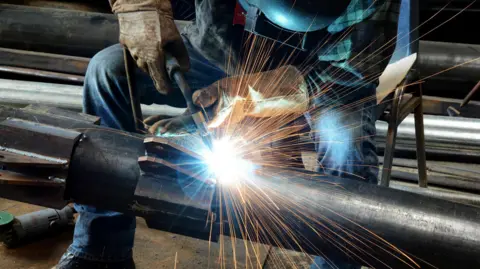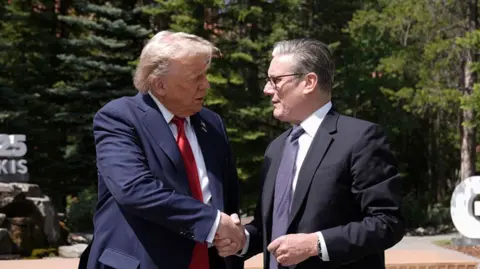UK-US tariff deal begins but still no news on steel
 Getty Images
Getty ImagesA deal to cut import tariffs between the US and UK has come into force, giving British car makers preferential access to the world's biggest consumer market.
It will allow UK motor manufacturers to sell up to 100,000 vehicles to the US at a tariff of 10% - a big advantage over international competitors - while tariffs on UK aerospace exports have been cut to zero.
In return, the UK will scrap tariffs on beef and US ethanol imports - a move which the British bioethanol industry says will make it impossible for it to compete.
However, UK steel and aluminium remain subject to a 25% tariff, which could double to 50% if the UK and US do not reach a deal by deadline day on 9 July.
The agreement, which was signed at the G7 summit earlier this month, cuts some of the sweeping tariffs imposed by US President Donald Trump that sent global markets into chaos in April.
UK Prime Minister Sir Kier Starmer called it a "historic deal" which would safeguard key industries vital to the British economy.
Under the US-UK agreement, UK carmakers can sell up to 100,000 cars a year to the US with a 10% tariff, down from 27.5%.
Tariffs on the UK aerospace sectors, too, will be removed.
The Business and Trade Secretary, Jonathan Reynolds, said the reduced tariffs would save sectors "hundreds of millions each year" and safeguard "thousands of jobs".
However, details on steel and aluminium tariffs have yet to be finalised. They remain subject to a 25% tariff, which could double to 50% if the UK and US do not reach a deal by the deadline.
'Massive headache'
Liam Bates is UK managing director at Sheffield-based Marcegaglia, which makes stainless steel long products such as rods and bars.
He told the BBC's Today programme the lack of an agreement on steel tariffs was "both frustrating and giving a lot of uncertainty".
The first 25% increase on steel import tariffs has gone through and it had "made trade a lot tougher" with the US.
But he said the real "kicker" was the fact that if an agreement cannot be reached by 9 July, then tariffs will double to 50%, which was giving his firm a "massive headache".
Marcegaglia produces steel in the US but the materials are supplied by its Sheffield plant.
"The lead times to get it to the plant are longer than the nine days left for the negotiations," Mr Bates said.
"So that means I would be shipping something - and a ship will probably have around £3m-£4m of product on it - and I don't know will I be paying £1.5m duty on it or zero?
"So it gives us an extremely hard decision to make as to how we can continue production in the US," he added.
In a Fox News interview aired on Sunday, Trump said he was unlikely to extend the 9 July deadline he has imposed on countries to secure deals with the US to avoid the higher tariffs. However, he has not ruled it out entirely.
"I don't think I'll need to," he said, "I could, no big deal".
Separately on Monday, the UK steel industry welcomed the government's decision to tighten existing safeguards on steel imports into the country, which threaten domestic producers.
There have been concerns that steel, originally bound for the US, could be diverted to countries including the UK and "dumped" at cheaper prices.
One of the changes means that overall steel import quotas will be allowed to rise by only 0.1%, rather than the 3% allowed by the existing regime.
 STEFAN ROUSSEAU/POOL/AFP via Getty Images
STEFAN ROUSSEAU/POOL/AFP via Getty ImagesAs part of the UK-US agreement, the UK will scrap a 20% tariff on US beef imports and raise the quota to 13,000 tonnes.
Some British farmers and consumers fear this could open the door to beef from cattle raised using hormones to boost their growth which many US American farmers use.
However, the government has said certification procedures and border checks will ensure hormone-reared beef does not enter the UK.
Up to 1.4 billion litres of US ethanol can also arrive in the UK tariff-free, doing away with the 19% tariff rate on US ethanol shipments previously.
But the UK bioethanol industry says the deal makes it impossible to compete with heavily subsidised US products.
In April, Trump imposed sweeping reciprocal duties on most trading partners worldwide but paused the tariffs days later to allow for negotiations.
On Friday, Trump said he had called off negotiations with Canada owing to the country's digital services tax.
However, on Sunday, Canada's finance ministry said it had rescinded its digital services tax in a bid to advance trade talks.
The two nations share among the largest trading relationships globally, involving more than $900bn (£656bn) of goods and services in 2024.
Other countries are also in the queue to broker deals with the US.
Thailand's commerce minister Pichai Naripthaphan has said the country will hold talks with the US, its largest trade partner, with hopes of reducing the tariffs imposed on Thai goods from 36% to as low as 10%.
